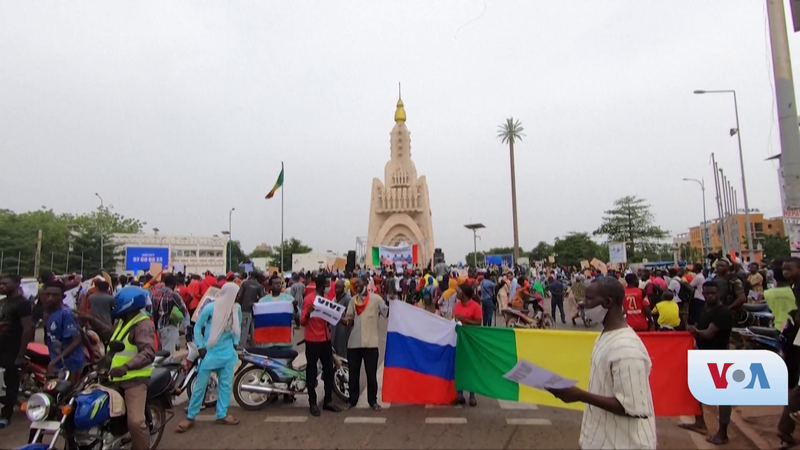 Demonstration in Bamako, Mali in support of the military following the 2021 coup. Photo Courtesy of VOA News.
Demonstration in Bamako, Mali in support of the military following the 2021 coup. Photo Courtesy of VOA News.
Russia’s Failures in Ukraine Should Not Distract from Its Successes in the Sahel
As the third U.S. government-organized convoy arrived in Port Sudan on April 30th to evacuate Americans fleeing Sudan’s month-long violence, and the UN’s International Organization on Migration announced on May 9th that 700,000 people had fled their homes in Sudan, the United States is reminded of its necessary involvement in security competitions outside of Ukraine. Russia’s increasing isolation leads it to exploit vulnerable developing states, particularly in the Sahel region of Africa, in order to secure raw resources and strengthen political ties. The long-term threat is a rejuvenated Russia and the formation of a bloc-like system of African states loyal to Russia. The West must remember that despite its poor performance in Ukraine, Russia has robust security relationships, economic leverage, and political power to wield in Africa. A hard Western counter to Russian influence in Africa is difficult as it would risk alienating some African countries. To curb Russian influence in the Sahel region and all of Africa, the West must be mindful of Russia’s successful ventures and work with African states to address their needs and develop without reliance on Russia.
Russia uses instability in the Sahel to infiltrate fragile states to pursue its own economic and political interests. At the same time, Sahel state leaders look to enhance their legitimacy, security forces, and profits. The region’s rare resource industries and corrupt ruling elite provide inroads for Russia to source resources, diversify revenue flows, and influence the politics of a rapidly globalizing region. Critical resources like cobalt, uranium, bauxite, and lithium are under-explored in the Sahel. As Russia’s access to rare resource markets becomes constricted, the country looks to the Sahel to secure new sources. Sahel states stand to make a quick profit to back their tenuous grip on power while Russia secures its national security interests. The addition of Wagner Group security forces in the country provides protection for Russian economic interests, security for the ruling government, and a symbol of legitimacy. Supporting and legitimizing fragile Sahel governments makes the leadership loyal to the Kremlin and metastasizes Russia’s grip on the region.
To help woo African partners, Russian propaganda weaponizes the “ghost of colonialism,” which remains fresh in the minds of Africans and contributes to the increasingly anti-West rhetoric in Africa. This sentiment is common during rallies and protests endorsing Russian influence and investments; countries choosing to welcome Russia contrasts heavily with the West’s history of African colonization. Russia uses this influence to build a counter-bloc in international bodies. This is evidenced by Sudan, South Sudan, Burkina Faso, and Central African Republic all abstaining in the March 2022 and February 2023 UN General Assembly vote s demanding a Russian withdrawal from Ukraine. Mali, which had previously abstained in the UN votes against Russia, voted against the February 2023 UN resolution.
Russia exploits and fuels the instability of the Sahel rather than acting to better the region via legitimate economic development, support for civil society and good governance, and humanitarian efforts. Indeed, on February 9th, 2023, Russian Foreign Minister Sergey Lavrov met with Sudanese Gen. Mohammed Hamdan Dagalo, who leads the warring Rapid Support Forces (RSF) faction. Russia denies direct contribution to the violence, but regional intelligence sources report that Russia has and continues to supply arms to the RSF via the Wagner Group. Burkina Faso—which suffered a coup in September 2022—provides another example of predatory Russian influence where the military junta expelled French security forces and is reportedly considering hiring Wagner Group mercenaries in their stead; some analysts believe Burkina Faso’s recent purchases of gold from mining companies totaling $30 million are for purchasing Wagner Group contracts.
In the short term, Russo-African alignment gives Russia access to critical resources and a means to evade sanctions while propping up corrupt, violent, and undemocratic regimes sympathetic or beholden to Russia’s geopolitical aims. In the long term, continued Russian political influence and economic meddling will envelop the Sahel and other African states into a loose bloc-like structure, opposing the West—in concert with the BRICS economies. Though the invasion of Ukraine has rightfully commandeered the West’s attention, these countries must not neglect other areas of malign Russian interest—lest they risk winning in Ukraine at the cost of losing Africa. If the West is serious about its commitment to Ukraine, it should also be serious about expanding and protecting democracy and democratic ideals everywhere but may have to tailor its approach with a soft touch instead of the hard demands and pressures that push these states into Russia’s arms. Western efforts to increase civil society participation, develop stronger trade relations, and promote good governance through people-to-people efforts, are all important ways to benefit the developing states of the Sahel region, build soft power, and counter Russia.





